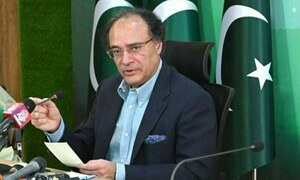Finance Minister Concludes Washington Visit with Key Meetings
ISLAMABAD: Senator Muhammad Aurangzeb, the Federal Minister for Finance and Revenue, wrapped up the fourth day of his visit to Washington, DC, engaging in a series of productive discussions with leading financial institutions, credit rating agencies, and multinational corporations during the Spring Meetings of the IMF and World Bank.
Engagement with VISA
The Finance Minister’s schedule commenced with a meeting with Andrew Torre, VISA’s Regional Vice President. He lauded VISA for its efforts in advancing the digitization of Pakistan’s economy and the introduction of diverse financial solutions.
He highlighted that VISA’s decision to expand its Pakistan office threefold, along with its partnerships with 1-Link and PayPak, would significantly boost financial inclusion, e-commerce, transaction security, payment gateways, and facilitate remittance inflows. Aurangzeb assured Torre of the government’s unwavering support in resolving any operational challenges in Pakistan.
Meeting with Philip Morris International
Subsequently, Minister Aurangzeb met with Christos Harpanditis, Vice President of Philip Morris International.
Acknowledging the company’s long-standing presence in Pakistan, the Finance Minister underscored the improving business environment and the government’s tax reforms centered on people, processes, and technology. He emphasized the vital importance of robust enforcement and compliance mechanisms to combat the illicit trade of cigarettes.
JP Morgan Seminar
At a seminar hosted by JP Morgan, entitled “Pakistan’s Economic and Monetary Policy Outlook,” the Finance Minister updated institutional investors on Pakistan’s stable macroeconomic indicators. These included twin surpluses, decreasing inflation, strong foreign exchange reserves, and prudent debt management—factors contributing to Fitch’s recent upgrade of the country’s sovereign credit rating.
Aurangzeb voiced serious concern regarding the loss of tourist lives in an incident in India, restating Pakistan’s firm condemnation of all forms of terrorism.
Discussions with Asian Development Bank (ADB)
In a meeting with Masato Kanda, President of the Asian Development Bank (ADB), Minister Aurangzeb congratulated him on his recent appointment. He also conveyed gratitude for the ADB’s enduring collaboration with Pakistan and its developmental contributions through initiatives like the Country Partnership Strategy 2026-2030 and budgetary support.
The two parties reviewed ADB’s project pipeline and pledged to expedite project implementation. Aurangzeb requested ADB’s assistance for a partial credit guarantee for the issuance of the Panda bond and expressed optimism for budgetary support realization this year.
He assured Kanda of Pakistan’s delegation’s participation in the CAREC meeting scheduled for November 2025.
Meetings with Rating Agencies
The Finance Minister engaged in separate discussions with Fitch Ratings and Moody’s, expressing gratitude to Fitch for upgrading Pakistan’s sovereign rating to B-. He outlined progress in structural reforms related to energy, taxation, state-owned enterprises (SOEs), public finance, and debt management.
During the meeting with Moody’s, he highlighted positive economic indicators, including low inflation, fiscal surpluses, and record remittances, while stressing reforms to broaden the tax base. Regarding trade matters, he reaffirmed Pakistan’s commitment to constructive dialogue with the US Administration.
Digital Transformation Discussions
The Finance Minister met with Sangbu Kim, World Bank’s Vice President for Digital Transformation, emphasizing Pakistan’s advancements under the Digital Pakistan Policy, especially in taxation reforms and the comprehensive digitization of the FBR (Federal Board of Revenue).
He emphasized the need for horizontal integration across government bodies and sought the Bank’s support in operationalizing the Country Partnership Framework (CPF) through technology.
Vulnerable 20 (V20) Ministerial Dialogue
At the Vulnerable 20 (V20) Ministerial Dialogue, themed “Enabling Climate Prosperity,” Senator Aurangzeb presented Pakistan’s Climate Financial Strategy and the development of a Climate Prosperity Plan.
He noted the recent staff-level agreement with the IMF under the Resilience and Sustainability Facility (RSF) and mentioned that the World Bank’s 10-year CPF prioritizes climate resilience and decarbonization.
The Minister advocated for reforms in international financial structures to assist climate-vulnerable nations and emphasized the necessity of capacity-building to cultivate viable climate projects.
Interaction with Pakistan Bank-Fund Staff Association (PBFSA)
The minister also engaged with members of the Pakistan Bank-Fund Staff Association (PBFSA), briefing them on Pakistan’s improving macroeconomic indicators, including the successful IMF staff-level agreement under the Extended Fund Facility (EFF) and RSF.
He also discussed the World Bank’s 10-year CPF, which addresses Pakistan’s challenges in population growth and climate change, and reiterated the government’s commitment to structural reforms.
Meeting with IMF Director
In a meeting with Jihad Azour, IMF Director for the Middle East and Central Asia, the Finance Minister thanked the IMF for the successful staff-level agreement on Pakistan’s economic program. He reaffirmed Pakistan’s commitment to sustaining reforms, citing Fitch’s sovereign credit rating upgrade (CCC+ to B-) as validation of the country’s progress.
Concluding Remarks with Standard Chartered Bank
Senator Aurangzeb concluded his day with a meeting with the Standard Chartered Bank delegation led by Roberto Hoornweg, acknowledging the bank’s role in bridging Pakistan’s financing gap during a critical period. He briefed the team on Pakistan’s macroeconomic stability, privatization program, and plans to re-enter international capital markets following the Fitch rating upgrade.



Comments (0)
No comments yet. Be the first to comment!
Leave a Comment